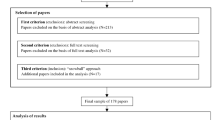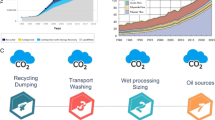Abstract
China has long enjoyed its position as the world’s cheapest production country. However, this position is being shaken due to the increasingly rising costs in China in pace with China’s rapid economic development. China’s New Labour Contract Law which took effect from 1 January 2008 has further pushed the labour costs in China in general. The purpose of this article is to arrive at an in-depth understanding of why foreign firms conduct sourcing in China where sourcing is becoming increasingly expensive. The experiences of four Swedish companies in the textile and clothing industry (TCI) conducting sourcing in China are presented. Our findings show that sourcing in China is becoming both cost- and strategy-driven. Companies purely chasing the cheapest production would most probably consider leaving China, whereas companies with a long-term strategic intent and a high level of business ethics and corporate social responsibility (CSR) practices will retain all or most of their sourcing activities on the Chinese soil despite the rising costs.
Similar content being viewed by others
References
Alguire, M.S., C. R. Frear and L. E. Metcalf: 1994, ‘An Examination of the Determinants of Global Sourcing Strategy’, Journal of Business and Industrial Marketing 9(2), 62-74.
Allwood, J. M., S. E. Laursen, C. M. Rodriguez and N. M. Bocken: 2006, Well Dressed? The Present and Future Sustainability of Clothing and Textiles in the United Kingdom (University of Cambridge Institute for Manufacturing, Cambridge, UK), ISBN 1-902546-52-0.
Andersen, M. and T. Skjoett-Larsen; 2009, ‘Corporate Social Responsibility in Global Supply Chains’, International Journal of Supply Chain Management 14(2), 75-86.
Arenas, D., J. Lozano and L. Albareda: 2009, ‘The Role of NGOs in CSR: Mutual Perceptions Among Stakeholders’, Journal of Business Ethics 88(1), 175-197.
Baker and McKenzie: 2007, Law of the People’s Republic of China on Employment Contracts. Adopted at the 28th Session of the Standing Committee of the 10th National People’s Congress on June 29, 2007. Effective from January 1, 2008, http://www.doroto.com/ewebeditor/UploadFile/20091118204717928.pdf.
Barney, J. B.: 1999, ‘How A Firm’s Capabilities Affect Boundary Decisions’, Sloan Management Review 40(3), 137-145.
Beckman, T., A. Colwell and P. H. Cunningham: 2009, ‘The Emergence of Corporate Social Responsibility in Chile: The Importance of Authenticity and Social Networks’, Journal of Business Ethics 86(Supplement 2), 191–206.
Beurden, P. and T. Gössling: 2008, ‘The Worth of Values – A Literature Review on the Relation Between Corporate Social and Financial Performance’, Journal of Business Ethics 82(2), 407-424.
Birkinshaw, J.; 2002, ‘The Art of Swedish Management’, Business Strategy Review 13(2), 11-19.
Bloomer, P.: 2005, When Jobs Lock Women into Poverty (Oxfam International, The Netherlands). Retrieved March 15, 2010, from (www.oxfam.org.uk/resources/policy/climate…/art_bloomer_labour.pdf).
Bradsher, K.: 2008, ‘Investors Seek Asian Options to Costly China’, International Herald Tribute, The global edition of The New York Times, June 8.
Bryman, A.: 2002, Samhällsvetenskapliga Metoder (Liber AB, Malmö, Sweden).
Carter, C. R. and M. M. Jennings: 2004, ‘The Role of Purchasing in Corporate Social Responsibility: A Structural Equation Analysis’, Journal of Business Logistics 25(1), 145–186.
Cele, S.: 2007, Tekoindustrierna 1907-2007 (Tekoindustrierna, Stockholm, Sweden).
Chen, M.: 2004, ‘Common Culture, Different Styles’, The Chinese Business Review, September–October, 53–58.
Chen, Y. F and M. Funke: 2009, ‘China’s New Labour Contract Law: No Harm to Employment?’ China Economic Review 20(3), 558-572.
Cho, J. and J. Kang: 2001, ‘Benefits and Challenges of Global Sourcing: Perceptions of US Apparel Retail Firms’, International Marketing Review 18(5), 542-561.
Cooper, D. R. and P. S. Schindler: 2006, Business Research Methods (McGraw-Hill Irwin, London, UK).
Cui, G. and Q. Liu: 2000, ‘Regional market segments of China: Opportunities and barriers in a big emerging market’, Journal of Consumer Marketing 17(1), 55-72.
Deloitte: 2009, Forget Rudolph, Consumers Looking to Digital to Guide Their Holiday Shopping. Retrieved March 10, 2010, from http://www.deloitte.com/print/en_US/us/Industries/Retail-Consumer-Business/press-release/b57f5303742e4210VgnVCM200000bb42f00aRCRD.htm.
Diller, J.: 1999, ‘A Social Conscience in the Global Marketplace? Labour Dimensions of Codes of Conduct, Social Labelling and Investor Initiatives’, International Labour Review 138(2), 99-129.
Domoney, R. 2007, Briefing on the Chinese Garment Industry. Labour Behind the Label, Women’s Wear Daily.
Dyer, J. H., D. S. Cho and W. Chu: 1998, ‘Strategic Supplier Segmentation: The Next ‘Best Practice’ in Supply Chain Management’, California Management Review 40(2), 57-77.
Egri, C. P. and D. A. Ralston: 2008, ‘Corporate responsibility: A review of international management research from 1998 to 2007’, Journal of International Management 14(4), 319-339.
Fan, Y.: 2002, ‘Questioning guanxi: Definition, Classification and Implications’, International Business Review 11(5), 543-561.
Fang, T.: 1999, Chinese Business Negotiating Style (Sage Publications, Thousand Oaks, California, USA).
Fang, T.: 2005, Chinese business style: ‘A Regional Approach’, in A. Macbean and D. Brown (eds.), Challenges for China’s Development: An Enterprise Perspective (Routledge, London), pp. 156-172.
Fang, T., S. Zhao and V. Worm: 2008, ‘Editorial: The changing Chinese culture and business behaviour’, International Business Review 17(2), 141-145.
Fassin, Y. and A. van Rossem: 2009, ‘Corporate Governance in the Debate on CSR and Ethics: Sensemaking of Social Issues in Management by Authorities and CEOs’, Corporate Governance: An International Review 17(5), 573-593.
Faure, G. O. and T. Fang: 2008, ‘Changing Chinese Values: Keeping up with Paradoxes’, International Business Review 17(2), 194-207.
Field, A. M.: 2008, ‘Sourcing in China’, Journal of Commerce 9 (42), 32-33.
Fletcher, K.: 2008, Sustainable Fashion and Textiles (Earthscan, London, UK).
Friedland, R. And R. R. Alford: 1991, ‘Bringing Society Back in: Symbols, Practices, and Institutional Contradictions’, in W. W. Powell and P. J. DiMaggio (eds.), The New Institutionalism in Organizational Analysis (The University of Chicago Press, Chicago, IL), pp. 232–266.
Gao, G., S. Ting-Toomey and W. B. Gudykunst: 1996, ‘Chinese Communication Processes’, in M. H. Bond (ed.), The Handbook of Chinese Psychology (Oxford University Press, Hong Kong), pp. 280-293.
Gauthier, C.: 2005, ‘Measuring Corporate Social and Environmental Performance: The Extended Life Cycle Assessment’, Journal of Business Ethics 59(1), 199-206.
Godfrey, P. C., C. B. Merrill and J. M. Hansen: 2009, ‘The Relationship between Corporate Social Responsibility and Shareholder Value: An Empirical Test of the Risk Management Hypothesis’, Strategic Management Journal 30(4), 425-445.
Gosier, B.: 2008, ‘Is Low-Cost Sourcing Still Viable?’ Logistics Management 47(10), 41-44.
Hemerling, J., Z. Momin and I. Rupf: 2002, Rethinking ‘Made in China’: Cars and Parts (The (Boston Consulting Group, Boston, Working Report, February 12, 2002).
Inglehart, R. and C. Welzel: 2005, Modernization, Cultural Change, and Democracy: The Human Development Sequence. New York: Cambridge University Press.
Jamali, D.: 2008, ‘A Stakeholder Approach to Corporate Social Responsibility: A Fresh Perspective into Theory and Practice’, Journal of Business Ethics 82(1), 213-231.
Kimberly, Jr.: 1976, ‘Organizational Size and the Structuralist Perspective: A Review, Critique, and Proposal’, Administrative Science Quarterly 21(4), 571-597.
Kohn, L. F.: 1993, ‘Global Sourcing: Broadening Your Supply Horizons’, Business Forum 18(1/2), 17.
Kotabe, M. and J. Y. Murray: 2004, ‘Global sourcing strategy and sustainable competitive advantage’, Industrial Marketing Management 33(1), 7-14.
Kumar, S., J. Medina and M. T. Nelson: 2009, ‘Is the Offshore Outsourcing Landscape for US Manufacturers Migrating Away from China?’ International Journal of Supply Chain Management 14(5), 342-348.
Lattemann, C., M. Fetscherin, I. Alon, S. Li and A. M. Schneider: 2009, ‘CSR Communication Intensity in Chinese and Indian Multinational Companies’, Corporate Governance: An International Review 17(4), 426-442.
Leach, P.: 2007, ‘Is China Losing Its Edge?’ Journal of Commerce 8(48), 10-14.
Levine, M. A.: 2008, ‘China’s CSR Expectations Mature’, China Business Review 35(6), 50-53.
Lund-Thomsen, P.: 2008, ‘The Global Sourcing and Codes of Conduct Debate: Five Myths and Five Recommendations’, Development and Change 39 (6), 1005-1018.
Luo, Y.: 2000, Guanxi and Business (World Scientific, Singapore).
May, S., G. Cheney and J. Roper: 2007, The Debate over Corporate Social Responsibility (Oxford University Press, Inc., New York, USA).
McGregor, R.: 2007, ‘We Must Count the True Cost of Cheap China’, Financial Times, August 2.
McWilliams, A. and D. Siegel: 2000, ‘Corporate Social Responsibility and Financial Performance: Correlation or Misspecification?’ Strategic Management Journal 21(5), 603-609.
Milne, R.: 2008, ‘Rising Costs hit FDI in China’, Financial Times, August 10.
Monczka, R. M., J. R. Carter, W. J. Markham, J. D. Blascovich and T. H. Slaight: 2005, Outsourcing Strategically for Sustainable Competitive Advantage (CAPS Research and A.T. Kearney, Inc., Tempe, AZ).
Nadvi, K. and S. Barrientos: 2004, Industrial Clusters and Poverty Reduction: Towards a Methodology for Poverty and Social Impact Assessment of Cluster Development Initiatives (UNIDO, Geneva).
O’Rourke, D.: 2003, ‘Outsourcing Regulation: Analyzing Nongovernmental Systems of Labor Standards and Monitoring’, Policy Studies Journal 31(1), 1-29.
Peloza, J.: 2006, ‘Using Corporate Social Responsibility as Insurance for Financial Performance’, California Management Review 48(2), 52–72.
Peng, M. W.: 2006, Global Strategy (Thomson South Western Educational Publishing, Mason, OH).
Porter, M. E. and M. R. Kramer: 2006, ‘Strategy and Society: The Link between Competitive Advantage and Corporate Social Responsibility’, Harvard Business Review 84(12), 78.
Prieto-Carrón, M. P. Lund-Thomsen, A. Chan, A. Muro and C. Bhushan: 2006, ‘Critical Perspectives on CSR and Development: What We Know, What We don’t Know, and What We Need to Know’, International Affairs 82(5), 977-987.
Redding, G.: 1990, The Spirit of Chinese Capitalism (Walter de Gruyte, Hamburg, Germany).
Roberts, D.: 2008, China’s Factory Blues. Business Week. March 27. Retrieved October 11, 2008, from http://www.businessweek.com/magazine/content/08_14/b4078078846220.htm?chan=search.
Salam, M. A.: 2009, ‘Corporate Social Responsibility in Purchasing and Supply Chain’, Journal of Business Ethics 85(Supplement 2), 355–370.
Saunders, M., P. Lewis and A. Thornhill: 2007, Research Methods for Business Students (Prentice Hall, London, UK).
Sethi, S. P.: 2009, ‘Globalization and the Good Corporation’, Journal of Business Ethics 87(Supplement 1): 1–2.
Shaw, W.: 2009, ‘Marxism, Business Ethics, and Corporate Social Responsibility’, Journal of Business Ethics 84(4), 565-576.
Simon, F. L.: 1995, ‘Global Corporate Philanthropy: A Strategic Framework’, International Marketing Review 12(4), 20-37.
Solomon, M. B.: 2009, ‘Global Sourcing, Fleeing China, Look Before You Leap’, DC Velocity, Strategic Insight, January 2009. Retrieved March 15, 2010, from http://www.dcvelocity.com/articles/20090101strategicinsight/.
Stalk, G.: 2006, ‘The Costly Secret of China Sourcing’, Harvard Business Review 84(2), 64-66.
Tan, J: 2009a, ‘Multinational Corporations and Social Responsibility in Emerging Markets: Opportunities and Challenges for Research and Practice’, Journal of Business Ethics 86(Supplement 2): 151–153.
Tan, J: 2009b, ‘Institutional Structure and Firm Social Performance in Transitional Economies: Evidence of Multinational Corporations in China’, Journal of Business Ethics 86(Supplement 2): 171–189.
Tan, J. and A. E. Tan: 2009, ‘Managing Public Relations in an Emerging Economy: The Case of Mercedes in China’, Journal of Business Ethics 86(Supplement 2): 257–266.
Terry-Cobo, S.: 2009, Yet Another Survey Finds Shoppers Willing to Pay the Green Premium. Retrieved March 10, 2010, from http://www.greenbiz.com/blog/2009/07/21/yet-another-survey-finds-shoppers-willing-pay-green-premium.
Thermaenius, P.: 2008, ‘Från Kina till Indien – Kostnadsjakt Driver Svenskarna till Nya Leverantörer’, Dagens Industri, November 8.
Tsogas, G.: 2001, Labor Regulation in a Global Economy (M. E. Sharpe, Armonk, NY, USA).
US-China Business Council: 2007, ‘The New Labor Contract Law’ China Business Review 34(6), 42–49.
van Herpen, E., J. M. E. Pennings and M. Meulenberg: 2003, Consumers’ Evaluation of Socially Responsible Activities in Retailing. Working Paper, Maastricht University, Maastricht, The Netherlands.
Waddock, S. A.: 2004, ‘Creating Corporate Accountability: Foundational Principles to Make Corporate Citizenship Real’, Journal of Business Ethics 50(4), 1-15.
Wang, H., R. P. Appelbaum, F. Degiuli and N. Lichtenstein: 2009, ‘China’s New Labour Contract Law: Is China Moving Towards Increased Power for Workers?’ Third World Quarterly 30(3), 485-501.
Weidenbaum, M.: 2009, ‘Who will Guard the Guardians? The Social Responsibility of NGOs’, Journal of Business Ethics 87(Supplement 1), 147–155.
Yin, R. K.: 1994, Case Study Research: Design and Methods (Sage Publications, Thousand Oaks, California, USA).
Yu, X.: 2008, ‘Impacts of Corporate Code of Conduct on Labor Standards: A Case Study of Reebok’s Athletic Footwear Supplier Factory in China’, Journal of Business Ethics 81(3), 513–529.
Author information
Authors and Affiliations
Corresponding author
Rights and permissions
About this article
Cite this article
Fang, T., Gunterberg, C. & Larsson, E. Sourcing in an Increasingly Expensive China: Four Swedish Cases. J Bus Ethics 97, 119–138 (2010). https://doi.org/10.1007/s10551-010-0499-9
Published:
Issue Date:
DOI: https://doi.org/10.1007/s10551-010-0499-9




